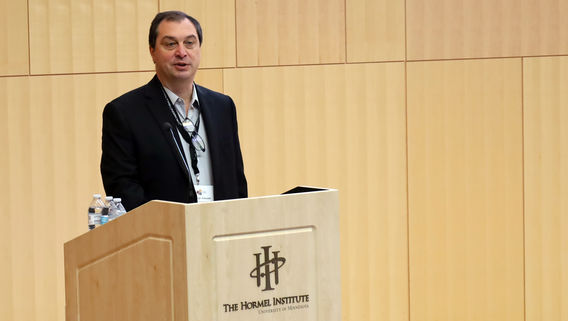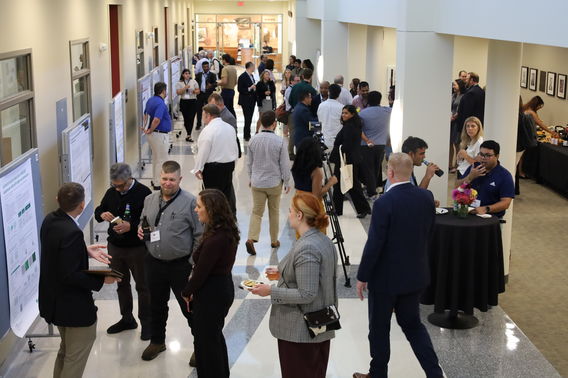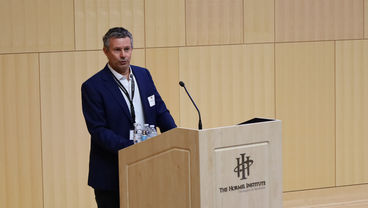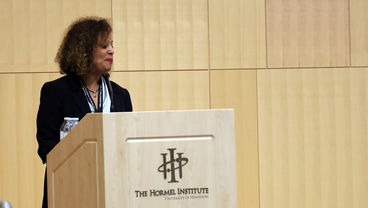
September 20, 2024 | Austin, Minn. — On Friday, September 20, The Hormel Institute, University of Minnesota, hosted the annual Viral Manufacturing and Translational Consortium (VMTC). The consortium gathered academic and industry experts from across the nation and world to discuss the latest research progress involving viral vectors and the importance of greater viral vector production availability so that safe and effective genetic therapies can more quickly arrive to patients in-clinic.
The Viral Manufacturing and Translational Consortium (VMTC) aims to accelerate the translation of life-changing therapies from bench to bedside in order to provide greater relief and more safe and effective treatment options to patients.
Viral vectors are used to deliver helpful or therapeutic genes to cells. The viruses used are selected for their specific properties, and potentially harmful genes are removed. Then, the virus capsid or shell is used as a “vehicle” or “shipping container” to contain the therapeutic genes and transport them into cells.

“Recombinant viruses or viral vectors have a long-proven record to treat genetic diseases and cancers that have no other clinical options beyond supportive and end-of-life care,” said George Aslanidi, PhD, Professor at The Hormel Institute. “There are a growing number of viral vector-based treatments approved by the FDA and regulatory agencies in other countries as gene replacement therapies, genetically modified lymphocytes or bone marrow, and vaccines against deadly infectious diseases such as ebola and COVID-19. Through numerous clinical studies, viral vectors confirmed their efficiency in achieving positive therapeutic outcomes where other treatments failed or were not evaluable. Importantly, viral vectors proved their safety for patients, the public, and the environment.”
However, one primary challenge in the world of viral vectors is the need for more streamlined production of viral vectors—which further delays research projects and how soon they may arrive to the patients who need them in-clinic. To make matters more challenging, viral vector production shortages also increase costs for both researchers and patients who will ultimately receive treatments.
Speaker talks explored ways viral vector manufacturing could be accelerated and improved (including if The Hormel Institute were to establish a production facility on its campus), research project progress and production approaches, and other necessary considerations in the development of gene therapy treatments making use of viral vectors.
“Production and purification of viral vectors are complex multi-step processes that require the separation of functional viral particles from cells that produce them, and from the original genetic material used in the production, and also from defective or dysfunctional viruses,” Dr. Aslanidi explained. “The losses during the purification process required plenty of raw material to accumulate a sufficient amount of the final product containing viral-based drugs.
“Additionally, safety requirements dictate the production of viral vectors in a well-controlled environment according to Good Manufacturing Practice. Thus, investment into a facility that complies with regulatory requirements adds to the final cost of the treatment.


“The solutions to reduce the cost of the treatments and increase treatment are twofold. First, the viral vector's potency can be increased by bioengineering of the viral capsid (shell) and the genetic material inside the vectors. Second, more efficient separation of viral vectors from raw material by the innovation of filtration, chromatography, and other techniques can help to reduce losses during purification and to produce contamination-free vectors.”
A poster session and reception followed the event.
Keynote speakers included Eduard Ayuso, PhD, Chief Technology Officer of DNAMIQS and Maritza McIntyre, PhD, President at Advanced Therapies Partners LLC.
Additional invited speakers included Rachel Legmann, PhD, Senior Director of Technology, Gene Therapy, Repligen Corporation; Michael A. Barry, PhD, Professor of Medicine, Division of Infectious Diseases, Department of Internal Medicine, Mayo Clinic, Rochester; R. Schott McIvor, PhD, Chief Development Officer, Immusoft, Professor, Genetics, Cell Biology and Development, University of Minnesota; Melanie Graham, MPH, PhD, Robert and Katherine Goodale Chair in Minimally Invasive Surgery, Professor, Department of Surgery, Medical School, Professor Department of Veterinary Population Medicine, College of Veterinary Medicine, Director of Preclinical Research Center, University of Minnesota; and David Largaespada, PhD, Professor of Pediatrics, Co-Director, Center for Genome Engineering, University of Minnesota.
